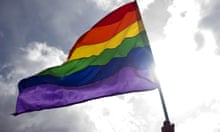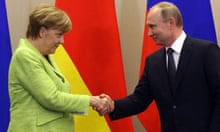German MPs have voted in favour of legalising same-sex marriage, prompting joyous and unusual scenes in parliament as Green party politicians tossed glittered confetti across the chamber and gay couples sitting in the public gallery kissed and embraced.
The vote by 393 to 226, with four abstentions, followed 40 minutes of often heated and highly emotional debate, reflecting a wider, decades-long argument over marriage equality. The German chancellor, Angela Merkel, voted against the move, despite having paved the way for the law’s passage by inviting MPs to vote according to their conscience.
Merkel had appeared to shift her longstanding opposition to gay marriage on Monday, when she said that she considered “the values lived out in a same-sex partnership equal to those in a heterosexual marriage”. After dropping a red “no” card into the ballot box in the Bundestag, she explained: “For me, marriage as defined by law is marriage between a man and a woman.
“It was a long, intensive, and for many also emotional discussion, that goes for me personally too, and I’m hopeful not only that there will be respect for either side’s opinions, but that it will also bring about more peace and cohesion in society,” she said.

Since 2001, same-sex couples in Germany have been able to enter into civil unions, but not to marry. Under the new law, which is expected to take effect before the end of the year, married, same-sex couples will also be able to adopt children together.
The vote marked a stunning farewell victory for the Green politician Volker Beck, 56, a veteran gay rights campaigner who was ending a 23-year career as a lawmaker yesterday. “Today a bastion has fallen,” he told the German news agency DPA.
The Lesbian and Gay Association, which has pushed for the reform since 1990, greeted the outcome, declaring that “Germany has voted for love”. “This is a historic day!” it said in a statement. “Not only for lesbians and gays, but also for a more just and democratic society.”
It remains something of a mystery as to whether Merkel is a canny operator who had meant to trigger the vote all along, or whether she was, as much as anyone else in the Bundestag, taken by surprise that it had happened.
What is clear is that she will now be able to take credit for having triggered the vote, despite the fact she and her alliance have been opposing moves towards marriage equality for decades.
Merkel has also effectively taken the wind out of the sails of her junior coalition partners, the Social Democrats (SPD), who have treated gay marriage as a key campaigning issue in the runup to elections in September.
Some within the ranks of Merkel’s own Christian Democratic Union (CDU) party were furious about having been bulldozed into a vote at short notice, although she will feel that she can hold her head high with disaffected colleagues because of her no vote.
Merkel faced a barrage of criticism from within the chamber, with the sharpest rebuke coming from the SPD’s Johannes Kahrs, who accused her of having stood in the way of the law for years. “In all honesty, Frau Merkel, thanks for nothing,” he said.
The vote was set in motion during an audience with Merkel at Berlin’s Maxim Gorki theatre on Monday evening, hosted by the women’s magazine Brigitte. Merkel held court on the issue of marriage equality for eight minutes towards the end of the question-and-answer session, after Ulli Köppe, a journalist and events manager who was sitting in the audience, asked her: “When will I be able to call my boyfriend my husband?”
Merkel responded pensively, saying she had given the issue much thought and had come to the conclusion that a same-sex partnership could be considered “just as valuable” as a heterosexual one, but she believed that “for those who are religious”, the question was more complicated, and ultimately down to an individual’s conscience.
She went on to describe a “life-changing experience” she had had after meeting a lesbian couple in her home constituency on Germany’s Baltic coast. She told the pair that her personal “sticking point” over same-sex marriage was the issue of children’s welfare.
Gundula Zilm, who has been in a relationship for years with her partner, Christine, with whom she cares for five foster children, invited Merkel to visit her at home to see how well her children were doing. Merkel said the encounter had led to a change of heart because authorities clearly had confidence in the couple’s ability to care for the children.
“If the state deems a child to be better off in a same-sex partnership than living in a household with a man and woman where violence is the norm, then I must recognise this and take it into consideration when making a judgment,” she said to applause.
Her U-turn was seized on by the SPD as an opportunity to hold a snap vote on the issue ahead of the summer recess and before elections on 24 September. The move was greeted with disdain by many of the members of Merkel’s conservative alliance, who accused the SPD of forcing the issue on the Bundestag.
Köppe, 28, who put the question to Merkel, was in the Bundestag’s public gallery on Friday to await the outcome of the debate he had effectively sparked. He said: “My question was totally spontaneous and unplanned. Because no one else in the audience was asking a question, I just grabbed the microphone.”
He said he had expected the chancellor to give him a “wishy-washy answer – as she’s done previously”, but that her detailed answer had surprised him. “It just happened to be the right question at the right time,” he said.
He and his partner of 12 years would now consider getting married. “Just having a civil union as has been possible until now was simply not enough for my boyfriend and me.”
Zilm, who watched the Bundestag debate on television, said she was “deeply disappointed” that Merkel had voted no, but was celebrating the outcome nonetheless. “I was very sad that Merkel voted against,” Zilm said. “But when the kids come home from school, we’re going to take them for an ice-cream.” She and her partner, Christine, already in a civil union, are also planning to marry, and have said they will invite Merkel.
The law is expected to come into force before the end of the year after it has been approved by the upper house and signed into law by the president. Renate Künast of the Greens urged registry offices across the country to “stock up on staff” to cope with the flood of marriage applicants.








